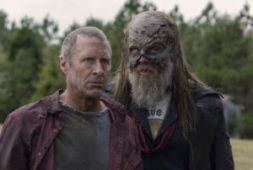
When I was a kid one of my favorite movies was Raiders of the Lost Ark. Hitler went on a quest for more power, even to the point of seeking “divine power.” Of course, he and his Nazi followers followed misguided notions thinking that the ark was some remote control to God’s power. They were gravely mistaken.
In the third film the Nazi’s sought more divine power, this time, eternal life. You’d think they would have learned from the ark incident, but no. The cup didn’t offer some magic form of eternal life, only death.
Power-hungry leaders always seem to fall in the same suit: narcissistic, sociopathic, and an obsession to wrestle with their own mortality. The Governor is three for three in these categories.
Once again, we’re learning that the most heinous rivals in the world of the walking dead is not the dead… but the living. The Governor is far scarier than any decaying corpse, but his evil is cloaked under the guise of a leader—a leader who lies to his people, kills for personal gain, and then revels over his collection of trophies from his kills.
Michonne seems to see right through him.
Andrea doesn’t.
But it doesn’t matter how many the Governor kills, because when it comes bedtime and he’s staring at his trophies by himself, he knows his life could be cut short any day. Mortality is one battle he’s never conquered, although he seems to have set Milton to the task to discover if there is any smattering of personality or memory left in the walking dead. Or is life as we know it truly over?
We caught a glimpse of this reasoning during the dinner scene at 28 minutes and change into the episode:
The Governor: Survival in the wild is tough sledding. Wake up every morning on the ground wondering if today is the day? Will it be quick and final or slow and well, without end? If someone had the good sense to kill my brain or will I come back as one of them? Do they think I will come back as one of them?
Milton: Do you think they remember anything? The person they once were?
Andrea: I don’t think about it
Sure, we don’t live in a world where the dead walk the earth, but have you ever wondered if there is more to this life?
Have you ever let the temporary pleasures around you distract you from what’s important?
SEASON 3, EPISODE 3 DISCUSSION QUESTIONS:
- Why do you think the Governor collects heads?
- Why is he so curious as to whether zombies remember their old life?
- In reality, how often do you think people think about their own mortality?
- How often do you think about your own mortality? What do you conclude?
Read the following passage from Scripture:
The living at least know they will die, but the dead know nothing. They have no further reward, nor are they remembered. Whatever they did in their lifetime—loving, hating, envying—is all long gone. They no longer play a part in anything here on earth. (Ecclesiastes 9:5-6, NLT)
- Why does the author of Ecclesiastes point out that the dead remember nothing?
- Why does he remind us that everything we did in our lifetime is “long gone”?
- The author of Ecclesiastes wraps up the book by saying, “Don’t let the excitement of youth cause you to forget your Creator.” (Eccl 12:1) What do you think he means by this?
- What are ways people let temporary pleasures distract them from an eternal focus on life with our Creator?
- What are distractions for you?
- What does God tell us to do with these kinds of distractions that hinder us? (Hebrews 12:1,2) How can you do that this week?
Jonathan McKee
Jonathan McKee is the author of over twenty books including the brand new The Guy's Guide to FOUR BATTLES Every Young Man Must Face; The Teen’s Guide to Social Media & Mobile Devices; If I Had a Parenting Do Over; and the Amazon Best Seller - The Guy's Guide to God, Girls and the Phone in Your Pocket. He speaks to parents and leaders worldwide, all while providing free resources for youth workers on TheSource4YM.com. Jonathan, his wife Lori, and their three kids live in California.



